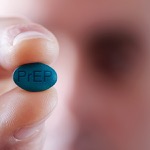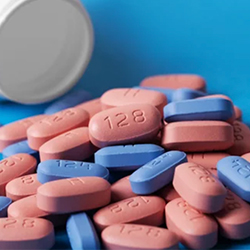New longer-acting treatment options for HIV may be on the horizon. A new phase 2 study presented at CROI 2025 has found 96% viral suppression in people with HIV who were taking lenacapavir (Sunlenca, Gilead) plus two broadly neutralizing antibodies (bNAbs). Investigator Onyema Ogbuagu, MBBCh, FACP, FIDSA, spoke to Infectious Disease Special Edition about his results and the potential that bNAbs hold for the future. Dr. Ogbuagu is an associate professor of medicine (AIDS) and of pharmacology and the director of the Yale Antivirals and Vaccines Research program at the Yale School of Medicine, in New Haven.
The following was transcribed by Temi.
Onyema Ogbuagu, MBBCh (00:09):
Hello, my name is Dr Onyema Ogbuagu. I'm an associate professor of medicine and pharmacology, and also the director of the Antivirals and Vaccines Research Program in the section of infectious diseases at the Yale School of Medicine.
What is the main takeaway from your research?
Onyema Ogbuagu, MBBCh (00:24):
Yeah, so our phase two study evaluated a full long-acting regimen, and so this was subcutaneously administered lenacapavir in addition to two broadly neutralizing antibodies, which are administered as infusions, all together given every six months to maintain viral suppression. So the people that we had come into the study were people who were biologically suppressed for at least a year, had CD4+ counts at 200 cells/mm3 or above, and suppressed on oral regimens, and we randomized them 2:1 to either go under six monthly investigational regimen or stay on their baseline oral regimen. And we found that six months in, that 96% in both groups remained virologically suppressed. So, there was only one individual who failed the regimen in the investigational arm. And so we think that the excellent efficacy results, we found it very promising, and the study continues.
What do you want providers to know about your phase 2 study?
Onyema Ogbuagu, MBBCh (01:24):
Yeah, so I think one of the reasons why we're excited about our results is it's really a direct response to the real world need for people living in HIV to have longer-acting regimens. And that's because the paradigm of having to take a tablet every day is easy for some, but not so easy for many. And that leads to poor adherence to therapy, which then manifests as treatment failure. And we've seen, not just from our study, but other studies that long-acting agents can help people stay biologically suppressed and liberates them from taking their pills. So the phase one was the proof of concept. This [phase two] builds on the great results that we had in the phase one where we've learned that when you select people who are highly sensitive to the broadly neutralizing antibodies that they're optimized for success. And with ... for those that are engaged in the study, the vast majority of them remain virologically suppressed.
Are there any other limitations?
Onyema Ogbuagu, MBBCh (02:23):
Yeah. So one of the concerns about broadly neutralizing antibodies is their breath, which is inherent in their name. I think the challenge is that HIV is a very diverse virus, and both within an individual and in between groups of individuals, there's so much viral diversity. And so finding broadly neutralizing antibodies that have sufficient breadth, which are able to show excellent activity against a breadth of viral strains, I think really is the limitation. But I think how we've all responded to that issue is finding combination of broadly neutralizing antibodies that are independently broad to begin with, but put together that work at different targets, if you will, of the HIV envelope, positions us better for success. So that way we improve its breadth. However, I will say in, in, in the study that we still had about, you know, like a 50% ... of individuals who were fully susceptible to broadly neutralizing antibodies in that study. And I think beyond that, I think the field would just like to see longer-term data on efficacy and safety, which is while we're continuing the study, we had six months data that were great, but we tend to continue the study to one year out and hopefully continue to showcase the durability of the efficacy and the safety that we've observed so far.




